BUSL204: Business Ethics Tutorial Assignment - Analysis of Cases
VerifiedAdded on 2022/09/16
|9
|2147
|17
Homework Assignment
AI Summary
This document presents a comprehensive analysis of a business ethics assignment, addressing various ethical frameworks and real-world case studies. The assignment explores the limitations of legal compliance in achieving ethical business practices and differentiates between relativist and univers...
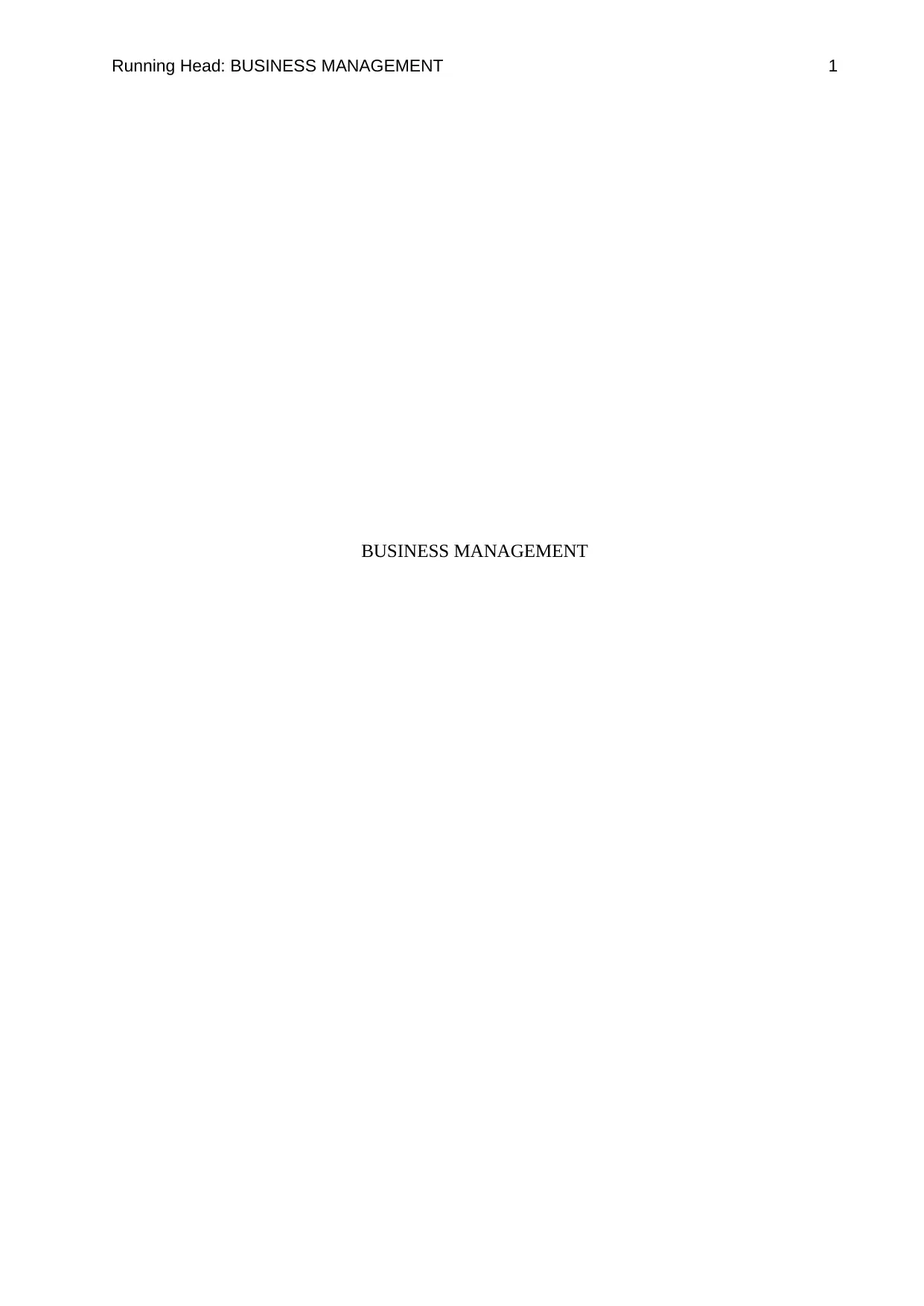
Running Head: BUSINESS MANAGEMENT 1
BUSINESS MANAGEMENT
BUSINESS MANAGEMENT
Paraphrase This Document
Need a fresh take? Get an instant paraphrase of this document with our AI Paraphraser
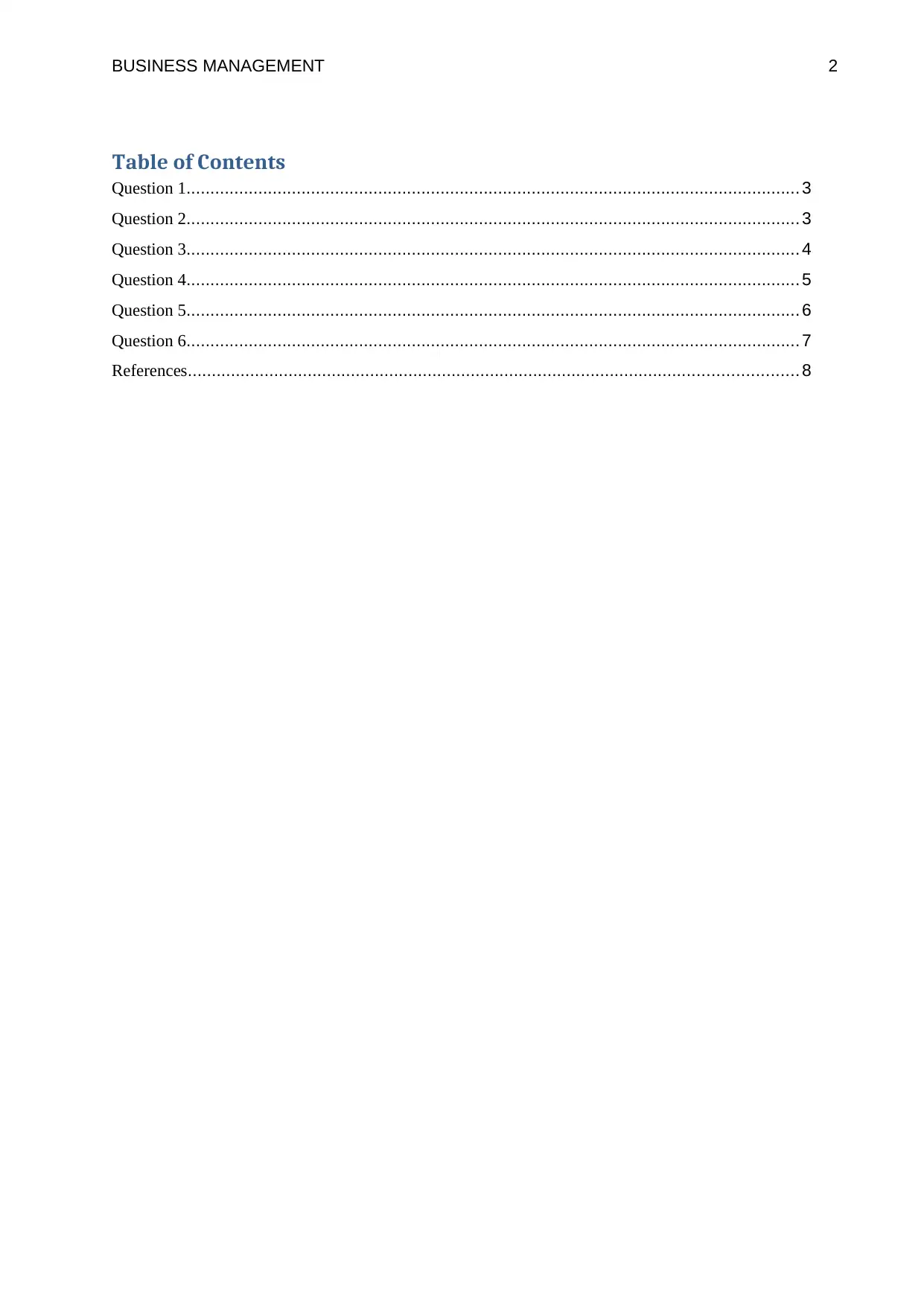
BUSINESS MANAGEMENT 2
Table of Contents
Question 1................................................................................................................................ 3
Question 2................................................................................................................................ 3
Question 3................................................................................................................................ 4
Question 4................................................................................................................................ 5
Question 5................................................................................................................................ 6
Question 6................................................................................................................................ 7
References............................................................................................................................... 8
Table of Contents
Question 1................................................................................................................................ 3
Question 2................................................................................................................................ 3
Question 3................................................................................................................................ 4
Question 4................................................................................................................................ 5
Question 5................................................................................................................................ 6
Question 6................................................................................................................................ 7
References............................................................................................................................... 8
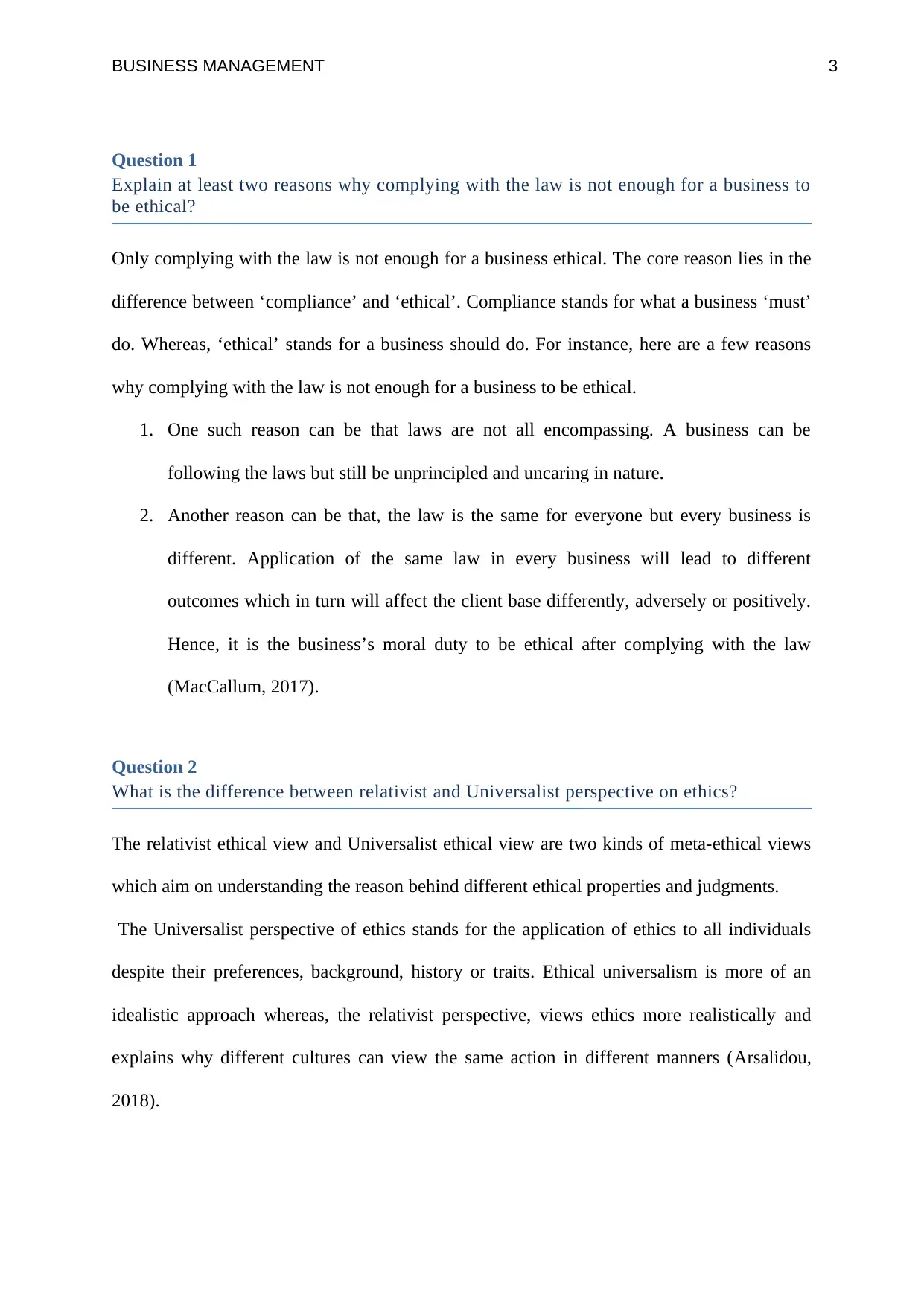
BUSINESS MANAGEMENT 3
Question 1
Explain at least two reasons why complying with the law is not enough for a business to
be ethical?
Only complying with the law is not enough for a business ethical. The core reason lies in the
difference between ‘compliance’ and ‘ethical’. Compliance stands for what a business ‘must’
do. Whereas, ‘ethical’ stands for a business should do. For instance, here are a few reasons
why complying with the law is not enough for a business to be ethical.
1. One such reason can be that laws are not all encompassing. A business can be
following the laws but still be unprincipled and uncaring in nature.
2. Another reason can be that, the law is the same for everyone but every business is
different. Application of the same law in every business will lead to different
outcomes which in turn will affect the client base differently, adversely or positively.
Hence, it is the business’s moral duty to be ethical after complying with the law
(MacCallum, 2017).
Question 2
What is the difference between relativist and Universalist perspective on ethics?
The relativist ethical view and Universalist ethical view are two kinds of meta-ethical views
which aim on understanding the reason behind different ethical properties and judgments.
The Universalist perspective of ethics stands for the application of ethics to all individuals
despite their preferences, background, history or traits. Ethical universalism is more of an
idealistic approach whereas, the relativist perspective, views ethics more realistically and
explains why different cultures can view the same action in different manners (Arsalidou,
2018).
Question 1
Explain at least two reasons why complying with the law is not enough for a business to
be ethical?
Only complying with the law is not enough for a business ethical. The core reason lies in the
difference between ‘compliance’ and ‘ethical’. Compliance stands for what a business ‘must’
do. Whereas, ‘ethical’ stands for a business should do. For instance, here are a few reasons
why complying with the law is not enough for a business to be ethical.
1. One such reason can be that laws are not all encompassing. A business can be
following the laws but still be unprincipled and uncaring in nature.
2. Another reason can be that, the law is the same for everyone but every business is
different. Application of the same law in every business will lead to different
outcomes which in turn will affect the client base differently, adversely or positively.
Hence, it is the business’s moral duty to be ethical after complying with the law
(MacCallum, 2017).
Question 2
What is the difference between relativist and Universalist perspective on ethics?
The relativist ethical view and Universalist ethical view are two kinds of meta-ethical views
which aim on understanding the reason behind different ethical properties and judgments.
The Universalist perspective of ethics stands for the application of ethics to all individuals
despite their preferences, background, history or traits. Ethical universalism is more of an
idealistic approach whereas, the relativist perspective, views ethics more realistically and
explains why different cultures can view the same action in different manners (Arsalidou,
2018).
⊘ This is a preview!⊘
Do you want full access?
Subscribe today to unlock all pages.

Trusted by 1+ million students worldwide
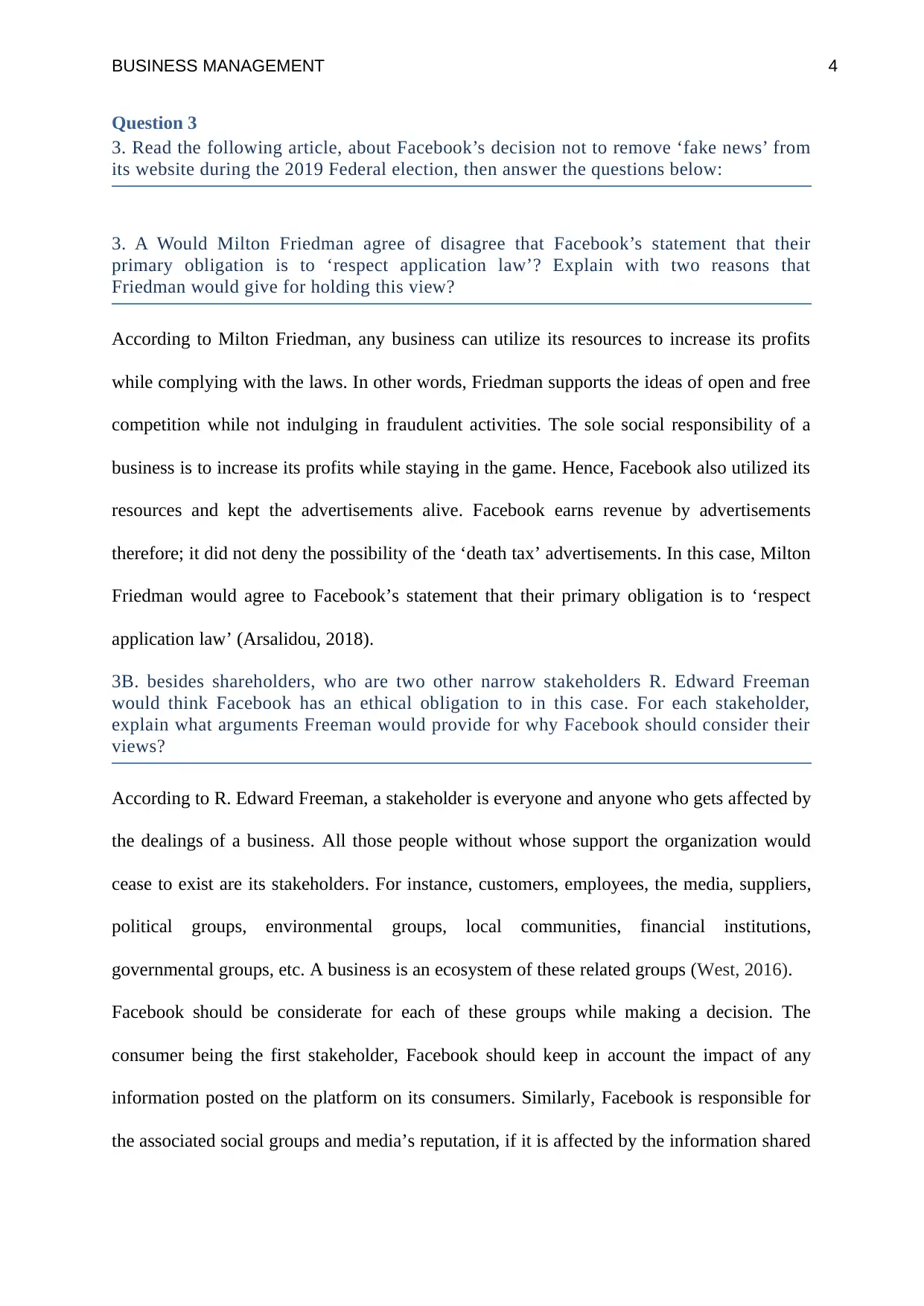
BUSINESS MANAGEMENT 4
Question 3
3. Read the following article, about Facebook’s decision not to remove ‘fake news’ from
its website during the 2019 Federal election, then answer the questions below:
3. A Would Milton Friedman agree of disagree that Facebook’s statement that their
primary obligation is to ‘respect application law’? Explain with two reasons that
Friedman would give for holding this view?
According to Milton Friedman, any business can utilize its resources to increase its profits
while complying with the laws. In other words, Friedman supports the ideas of open and free
competition while not indulging in fraudulent activities. The sole social responsibility of a
business is to increase its profits while staying in the game. Hence, Facebook also utilized its
resources and kept the advertisements alive. Facebook earns revenue by advertisements
therefore; it did not deny the possibility of the ‘death tax’ advertisements. In this case, Milton
Friedman would agree to Facebook’s statement that their primary obligation is to ‘respect
application law’ (Arsalidou, 2018).
3B. besides shareholders, who are two other narrow stakeholders R. Edward Freeman
would think Facebook has an ethical obligation to in this case. For each stakeholder,
explain what arguments Freeman would provide for why Facebook should consider their
views?
According to R. Edward Freeman, a stakeholder is everyone and anyone who gets affected by
the dealings of a business. All those people without whose support the organization would
cease to exist are its stakeholders. For instance, customers, employees, the media, suppliers,
political groups, environmental groups, local communities, financial institutions,
governmental groups, etc. A business is an ecosystem of these related groups (West, 2016).
Facebook should be considerate for each of these groups while making a decision. The
consumer being the first stakeholder, Facebook should keep in account the impact of any
information posted on the platform on its consumers. Similarly, Facebook is responsible for
the associated social groups and media’s reputation, if it is affected by the information shared
Question 3
3. Read the following article, about Facebook’s decision not to remove ‘fake news’ from
its website during the 2019 Federal election, then answer the questions below:
3. A Would Milton Friedman agree of disagree that Facebook’s statement that their
primary obligation is to ‘respect application law’? Explain with two reasons that
Friedman would give for holding this view?
According to Milton Friedman, any business can utilize its resources to increase its profits
while complying with the laws. In other words, Friedman supports the ideas of open and free
competition while not indulging in fraudulent activities. The sole social responsibility of a
business is to increase its profits while staying in the game. Hence, Facebook also utilized its
resources and kept the advertisements alive. Facebook earns revenue by advertisements
therefore; it did not deny the possibility of the ‘death tax’ advertisements. In this case, Milton
Friedman would agree to Facebook’s statement that their primary obligation is to ‘respect
application law’ (Arsalidou, 2018).
3B. besides shareholders, who are two other narrow stakeholders R. Edward Freeman
would think Facebook has an ethical obligation to in this case. For each stakeholder,
explain what arguments Freeman would provide for why Facebook should consider their
views?
According to R. Edward Freeman, a stakeholder is everyone and anyone who gets affected by
the dealings of a business. All those people without whose support the organization would
cease to exist are its stakeholders. For instance, customers, employees, the media, suppliers,
political groups, environmental groups, local communities, financial institutions,
governmental groups, etc. A business is an ecosystem of these related groups (West, 2016).
Facebook should be considerate for each of these groups while making a decision. The
consumer being the first stakeholder, Facebook should keep in account the impact of any
information posted on the platform on its consumers. Similarly, Facebook is responsible for
the associated social groups and media’s reputation, if it is affected by the information shared
Paraphrase This Document
Need a fresh take? Get an instant paraphrase of this document with our AI Paraphraser
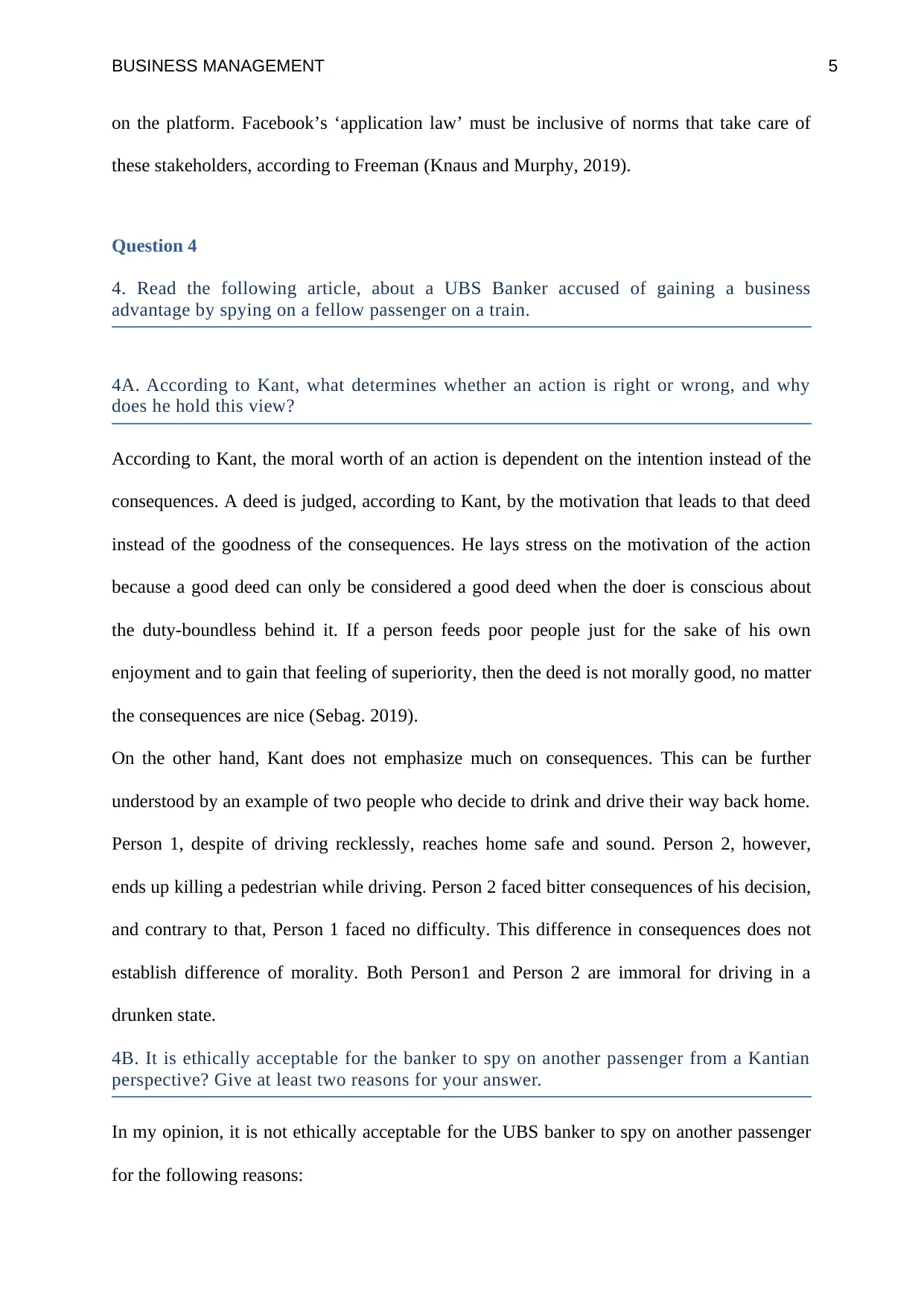
BUSINESS MANAGEMENT 5
on the platform. Facebook’s ‘application law’ must be inclusive of norms that take care of
these stakeholders, according to Freeman (Knaus and Murphy, 2019).
Question 4
4. Read the following article, about a UBS Banker accused of gaining a business
advantage by spying on a fellow passenger on a train.
4A. According to Kant, what determines whether an action is right or wrong, and why
does he hold this view?
According to Kant, the moral worth of an action is dependent on the intention instead of the
consequences. A deed is judged, according to Kant, by the motivation that leads to that deed
instead of the goodness of the consequences. He lays stress on the motivation of the action
because a good deed can only be considered a good deed when the doer is conscious about
the duty-boundless behind it. If a person feeds poor people just for the sake of his own
enjoyment and to gain that feeling of superiority, then the deed is not morally good, no matter
the consequences are nice (Sebag. 2019).
On the other hand, Kant does not emphasize much on consequences. This can be further
understood by an example of two people who decide to drink and drive their way back home.
Person 1, despite of driving recklessly, reaches home safe and sound. Person 2, however,
ends up killing a pedestrian while driving. Person 2 faced bitter consequences of his decision,
and contrary to that, Person 1 faced no difficulty. This difference in consequences does not
establish difference of morality. Both Person1 and Person 2 are immoral for driving in a
drunken state.
4B. It is ethically acceptable for the banker to spy on another passenger from a Kantian
perspective? Give at least two reasons for your answer.
In my opinion, it is not ethically acceptable for the UBS banker to spy on another passenger
for the following reasons:
on the platform. Facebook’s ‘application law’ must be inclusive of norms that take care of
these stakeholders, according to Freeman (Knaus and Murphy, 2019).
Question 4
4. Read the following article, about a UBS Banker accused of gaining a business
advantage by spying on a fellow passenger on a train.
4A. According to Kant, what determines whether an action is right or wrong, and why
does he hold this view?
According to Kant, the moral worth of an action is dependent on the intention instead of the
consequences. A deed is judged, according to Kant, by the motivation that leads to that deed
instead of the goodness of the consequences. He lays stress on the motivation of the action
because a good deed can only be considered a good deed when the doer is conscious about
the duty-boundless behind it. If a person feeds poor people just for the sake of his own
enjoyment and to gain that feeling of superiority, then the deed is not morally good, no matter
the consequences are nice (Sebag. 2019).
On the other hand, Kant does not emphasize much on consequences. This can be further
understood by an example of two people who decide to drink and drive their way back home.
Person 1, despite of driving recklessly, reaches home safe and sound. Person 2, however,
ends up killing a pedestrian while driving. Person 2 faced bitter consequences of his decision,
and contrary to that, Person 1 faced no difficulty. This difference in consequences does not
establish difference of morality. Both Person1 and Person 2 are immoral for driving in a
drunken state.
4B. It is ethically acceptable for the banker to spy on another passenger from a Kantian
perspective? Give at least two reasons for your answer.
In my opinion, it is not ethically acceptable for the UBS banker to spy on another passenger
for the following reasons:
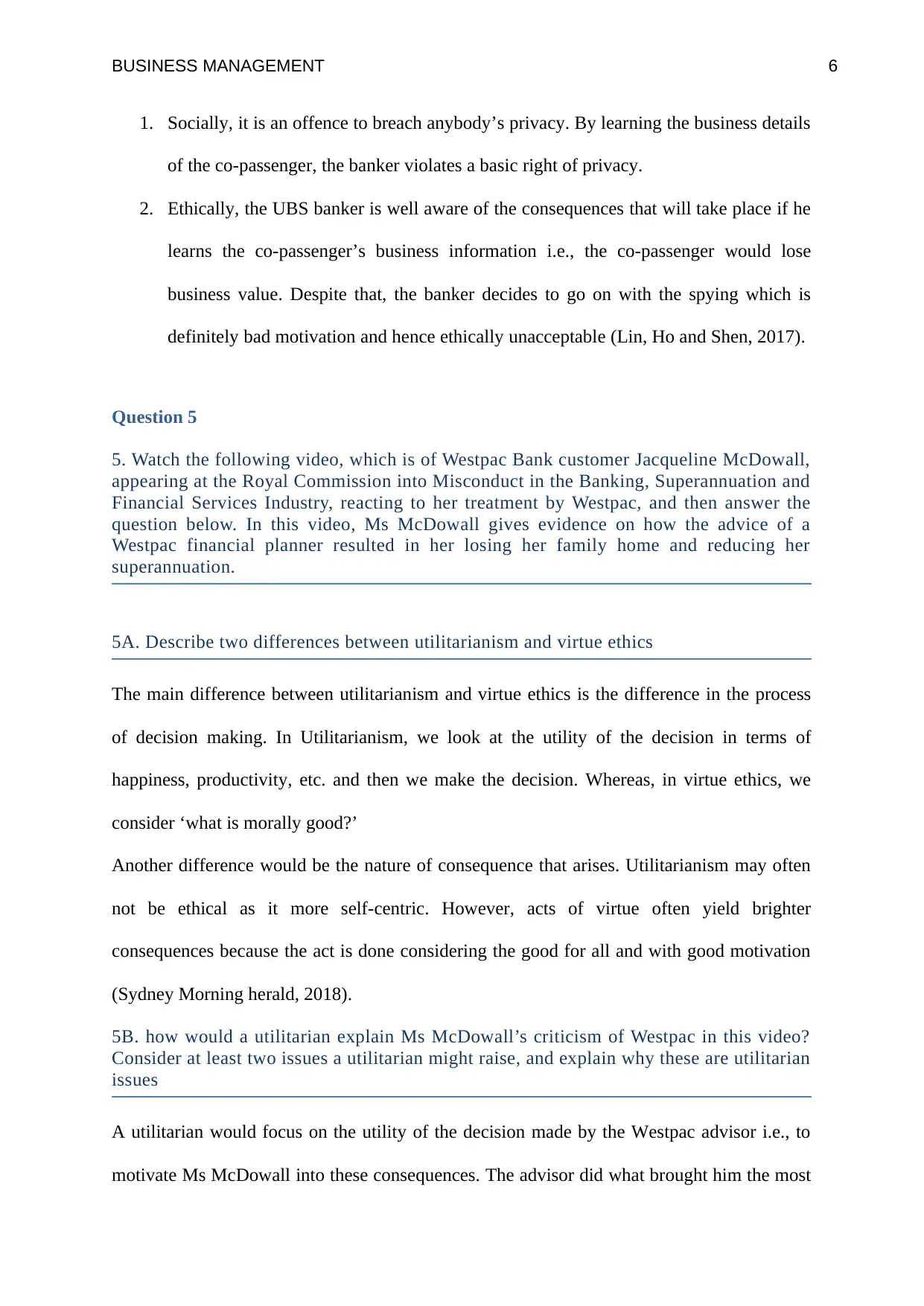
BUSINESS MANAGEMENT 6
1. Socially, it is an offence to breach anybody’s privacy. By learning the business details
of the co-passenger, the banker violates a basic right of privacy.
2. Ethically, the UBS banker is well aware of the consequences that will take place if he
learns the co-passenger’s business information i.e., the co-passenger would lose
business value. Despite that, the banker decides to go on with the spying which is
definitely bad motivation and hence ethically unacceptable (Lin, Ho and Shen, 2017).
Question 5
5. Watch the following video, which is of Westpac Bank customer Jacqueline McDowall,
appearing at the Royal Commission into Misconduct in the Banking, Superannuation and
Financial Services Industry, reacting to her treatment by Westpac, and then answer the
question below. In this video, Ms McDowall gives evidence on how the advice of a
Westpac financial planner resulted in her losing her family home and reducing her
superannuation.
5A. Describe two differences between utilitarianism and virtue ethics
The main difference between utilitarianism and virtue ethics is the difference in the process
of decision making. In Utilitarianism, we look at the utility of the decision in terms of
happiness, productivity, etc. and then we make the decision. Whereas, in virtue ethics, we
consider ‘what is morally good?’
Another difference would be the nature of consequence that arises. Utilitarianism may often
not be ethical as it more self-centric. However, acts of virtue often yield brighter
consequences because the act is done considering the good for all and with good motivation
(Sydney Morning herald, 2018).
5B. how would a utilitarian explain Ms McDowall’s criticism of Westpac in this video?
Consider at least two issues a utilitarian might raise, and explain why these are utilitarian
issues
A utilitarian would focus on the utility of the decision made by the Westpac advisor i.e., to
motivate Ms McDowall into these consequences. The advisor did what brought him the most
1. Socially, it is an offence to breach anybody’s privacy. By learning the business details
of the co-passenger, the banker violates a basic right of privacy.
2. Ethically, the UBS banker is well aware of the consequences that will take place if he
learns the co-passenger’s business information i.e., the co-passenger would lose
business value. Despite that, the banker decides to go on with the spying which is
definitely bad motivation and hence ethically unacceptable (Lin, Ho and Shen, 2017).
Question 5
5. Watch the following video, which is of Westpac Bank customer Jacqueline McDowall,
appearing at the Royal Commission into Misconduct in the Banking, Superannuation and
Financial Services Industry, reacting to her treatment by Westpac, and then answer the
question below. In this video, Ms McDowall gives evidence on how the advice of a
Westpac financial planner resulted in her losing her family home and reducing her
superannuation.
5A. Describe two differences between utilitarianism and virtue ethics
The main difference between utilitarianism and virtue ethics is the difference in the process
of decision making. In Utilitarianism, we look at the utility of the decision in terms of
happiness, productivity, etc. and then we make the decision. Whereas, in virtue ethics, we
consider ‘what is morally good?’
Another difference would be the nature of consequence that arises. Utilitarianism may often
not be ethical as it more self-centric. However, acts of virtue often yield brighter
consequences because the act is done considering the good for all and with good motivation
(Sydney Morning herald, 2018).
5B. how would a utilitarian explain Ms McDowall’s criticism of Westpac in this video?
Consider at least two issues a utilitarian might raise, and explain why these are utilitarian
issues
A utilitarian would focus on the utility of the decision made by the Westpac advisor i.e., to
motivate Ms McDowall into these consequences. The advisor did what brought him the most
⊘ This is a preview!⊘
Do you want full access?
Subscribe today to unlock all pages.

Trusted by 1+ million students worldwide
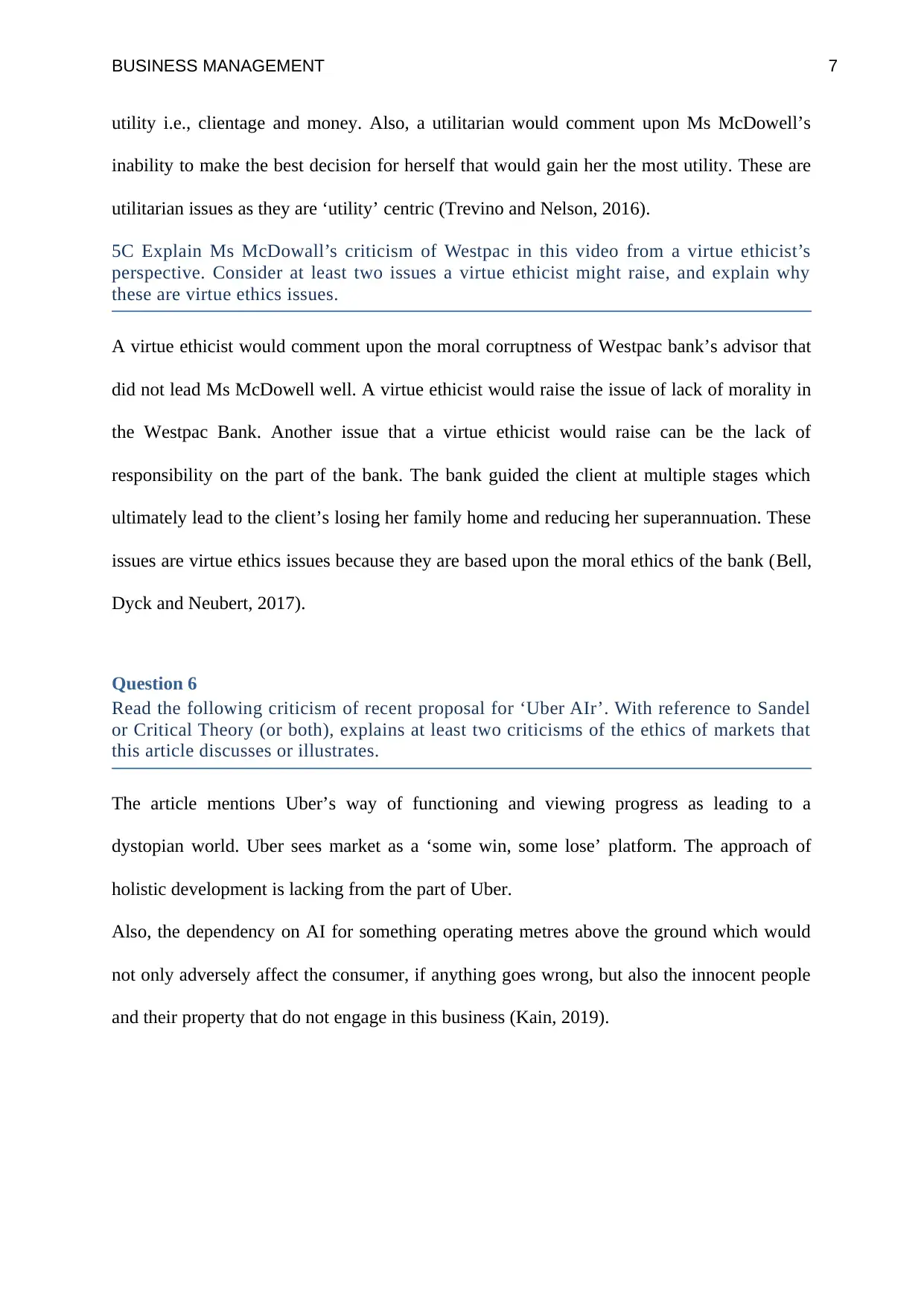
BUSINESS MANAGEMENT 7
utility i.e., clientage and money. Also, a utilitarian would comment upon Ms McDowell’s
inability to make the best decision for herself that would gain her the most utility. These are
utilitarian issues as they are ‘utility’ centric (Trevino and Nelson, 2016).
5C Explain Ms McDowall’s criticism of Westpac in this video from a virtue ethicist’s
perspective. Consider at least two issues a virtue ethicist might raise, and explain why
these are virtue ethics issues.
A virtue ethicist would comment upon the moral corruptness of Westpac bank’s advisor that
did not lead Ms McDowell well. A virtue ethicist would raise the issue of lack of morality in
the Westpac Bank. Another issue that a virtue ethicist would raise can be the lack of
responsibility on the part of the bank. The bank guided the client at multiple stages which
ultimately lead to the client’s losing her family home and reducing her superannuation. These
issues are virtue ethics issues because they are based upon the moral ethics of the bank (Bell,
Dyck and Neubert, 2017).
Question 6
Read the following criticism of recent proposal for ‘Uber AIr’. With reference to Sandel
or Critical Theory (or both), explains at least two criticisms of the ethics of markets that
this article discusses or illustrates.
The article mentions Uber’s way of functioning and viewing progress as leading to a
dystopian world. Uber sees market as a ‘some win, some lose’ platform. The approach of
holistic development is lacking from the part of Uber.
Also, the dependency on AI for something operating metres above the ground which would
not only adversely affect the consumer, if anything goes wrong, but also the innocent people
and their property that do not engage in this business (Kain, 2019).
utility i.e., clientage and money. Also, a utilitarian would comment upon Ms McDowell’s
inability to make the best decision for herself that would gain her the most utility. These are
utilitarian issues as they are ‘utility’ centric (Trevino and Nelson, 2016).
5C Explain Ms McDowall’s criticism of Westpac in this video from a virtue ethicist’s
perspective. Consider at least two issues a virtue ethicist might raise, and explain why
these are virtue ethics issues.
A virtue ethicist would comment upon the moral corruptness of Westpac bank’s advisor that
did not lead Ms McDowell well. A virtue ethicist would raise the issue of lack of morality in
the Westpac Bank. Another issue that a virtue ethicist would raise can be the lack of
responsibility on the part of the bank. The bank guided the client at multiple stages which
ultimately lead to the client’s losing her family home and reducing her superannuation. These
issues are virtue ethics issues because they are based upon the moral ethics of the bank (Bell,
Dyck and Neubert, 2017).
Question 6
Read the following criticism of recent proposal for ‘Uber AIr’. With reference to Sandel
or Critical Theory (or both), explains at least two criticisms of the ethics of markets that
this article discusses or illustrates.
The article mentions Uber’s way of functioning and viewing progress as leading to a
dystopian world. Uber sees market as a ‘some win, some lose’ platform. The approach of
holistic development is lacking from the part of Uber.
Also, the dependency on AI for something operating metres above the ground which would
not only adversely affect the consumer, if anything goes wrong, but also the innocent people
and their property that do not engage in this business (Kain, 2019).
Paraphrase This Document
Need a fresh take? Get an instant paraphrase of this document with our AI Paraphraser
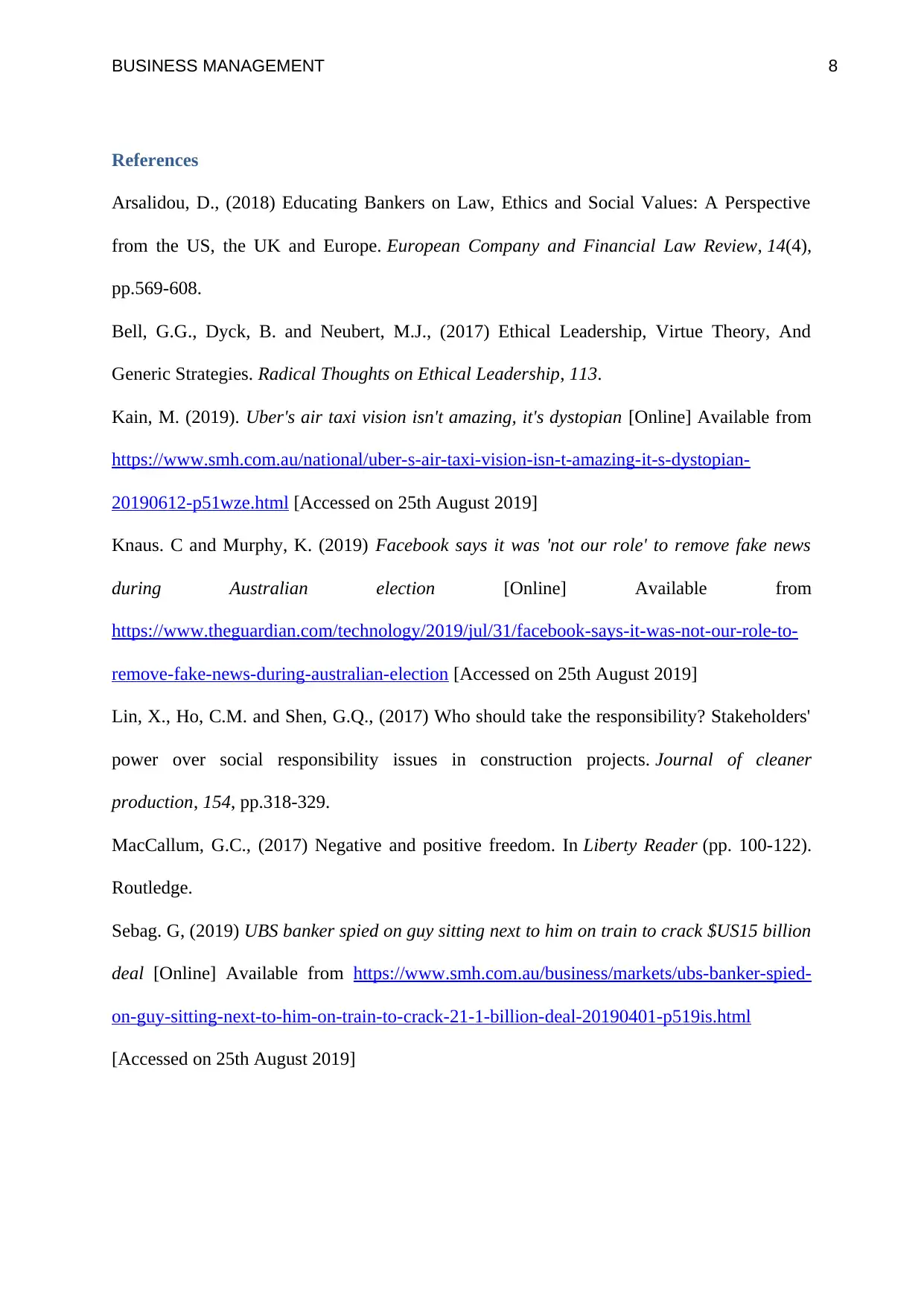
BUSINESS MANAGEMENT 8
References
Arsalidou, D., (2018) Educating Bankers on Law, Ethics and Social Values: A Perspective
from the US, the UK and Europe. European Company and Financial Law Review, 14(4),
pp.569-608.
Bell, G.G., Dyck, B. and Neubert, M.J., (2017) Ethical Leadership, Virtue Theory, And
Generic Strategies. Radical Thoughts on Ethical Leadership, 113.
Kain, M. (2019). Uber's air taxi vision isn't amazing, it's dystopian [Online] Available from
https://www.smh.com.au/national/uber-s-air-taxi-vision-isn-t-amazing-it-s-dystopian-
20190612-p51wze.html [Accessed on 25th August 2019]
Knaus. C and Murphy, K. (2019) Facebook says it was 'not our role' to remove fake news
during Australian election [Online] Available from
https://www.theguardian.com/technology/2019/jul/31/facebook-says-it-was-not-our-role-to-
remove-fake-news-during-australian-election [Accessed on 25th August 2019]
Lin, X., Ho, C.M. and Shen, G.Q., (2017) Who should take the responsibility? Stakeholders'
power over social responsibility issues in construction projects. Journal of cleaner
production, 154, pp.318-329.
MacCallum, G.C., (2017) Negative and positive freedom. In Liberty Reader (pp. 100-122).
Routledge.
Sebag. G, (2019) UBS banker spied on guy sitting next to him on train to crack $US15 billion
deal [Online] Available from https://www.smh.com.au/business/markets/ubs-banker-spied-
on-guy-sitting-next-to-him-on-train-to-crack-21-1-billion-deal-20190401-p519is.html
[Accessed on 25th August 2019]
References
Arsalidou, D., (2018) Educating Bankers on Law, Ethics and Social Values: A Perspective
from the US, the UK and Europe. European Company and Financial Law Review, 14(4),
pp.569-608.
Bell, G.G., Dyck, B. and Neubert, M.J., (2017) Ethical Leadership, Virtue Theory, And
Generic Strategies. Radical Thoughts on Ethical Leadership, 113.
Kain, M. (2019). Uber's air taxi vision isn't amazing, it's dystopian [Online] Available from
https://www.smh.com.au/national/uber-s-air-taxi-vision-isn-t-amazing-it-s-dystopian-
20190612-p51wze.html [Accessed on 25th August 2019]
Knaus. C and Murphy, K. (2019) Facebook says it was 'not our role' to remove fake news
during Australian election [Online] Available from
https://www.theguardian.com/technology/2019/jul/31/facebook-says-it-was-not-our-role-to-
remove-fake-news-during-australian-election [Accessed on 25th August 2019]
Lin, X., Ho, C.M. and Shen, G.Q., (2017) Who should take the responsibility? Stakeholders'
power over social responsibility issues in construction projects. Journal of cleaner
production, 154, pp.318-329.
MacCallum, G.C., (2017) Negative and positive freedom. In Liberty Reader (pp. 100-122).
Routledge.
Sebag. G, (2019) UBS banker spied on guy sitting next to him on train to crack $US15 billion
deal [Online] Available from https://www.smh.com.au/business/markets/ubs-banker-spied-
on-guy-sitting-next-to-him-on-train-to-crack-21-1-billion-deal-20190401-p519is.html
[Accessed on 25th August 2019]
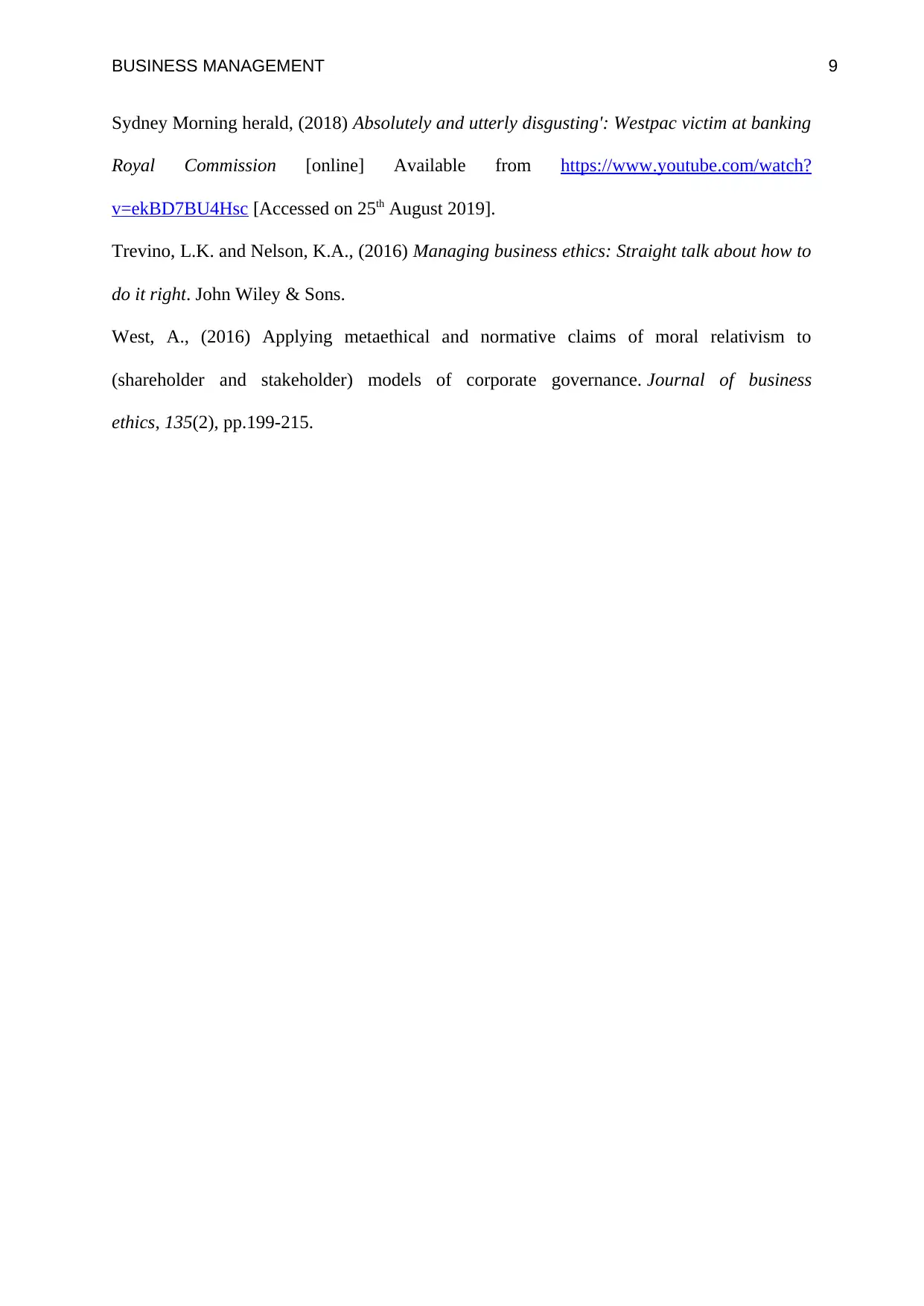
BUSINESS MANAGEMENT 9
Sydney Morning herald, (2018) Absolutely and utterly disgusting': Westpac victim at banking
Royal Commission [online] Available from https://www.youtube.com/watch?
v=ekBD7BU4Hsc [Accessed on 25th August 2019].
Trevino, L.K. and Nelson, K.A., (2016) Managing business ethics: Straight talk about how to
do it right. John Wiley & Sons.
West, A., (2016) Applying metaethical and normative claims of moral relativism to
(shareholder and stakeholder) models of corporate governance. Journal of business
ethics, 135(2), pp.199-215.
Sydney Morning herald, (2018) Absolutely and utterly disgusting': Westpac victim at banking
Royal Commission [online] Available from https://www.youtube.com/watch?
v=ekBD7BU4Hsc [Accessed on 25th August 2019].
Trevino, L.K. and Nelson, K.A., (2016) Managing business ethics: Straight talk about how to
do it right. John Wiley & Sons.
West, A., (2016) Applying metaethical and normative claims of moral relativism to
(shareholder and stakeholder) models of corporate governance. Journal of business
ethics, 135(2), pp.199-215.
⊘ This is a preview!⊘
Do you want full access?
Subscribe today to unlock all pages.

Trusted by 1+ million students worldwide
1 out of 9
Related Documents
Your All-in-One AI-Powered Toolkit for Academic Success.
+13062052269
info@desklib.com
Available 24*7 on WhatsApp / Email
![[object Object]](/_next/static/media/star-bottom.7253800d.svg)
Unlock your academic potential
© 2024 | Zucol Services PVT LTD | All rights reserved.



